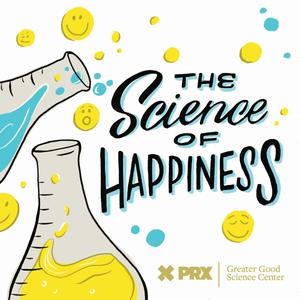
The Science of Happiness
Shuka Kalantari
Learn research-tested strategies for a happier, more meaningful life, drawing on the science of compassion, gratitude, mindfulness, and awe. Hosted by award-winning psychologist Dacher Keltner. Co-produced by PRX and UC Berkeley's Greater Good Science Center.
- 7 minutes 3 secondsHappiness Break: Pause to Look at the Sky, With Dacher (Encore)
Take a moment to appreciate the beauty and vastness of the sky. Dacher Keltner guides us through a practice of pausing to turn your gaze to the sky as a pathway to awe, creativity and wonder.
Link to episode transcript: https://tinyurl.com/yc5xfwp4
Practice:
- Go someplace where you feel safe and also have a nice view of the sky.
- First, focus on your breathing. Take a few slow inhales and even slower exhales. As you breathe in and out, relax your shoulders, your hands, and your face.
- On the next breath in, look up at the sky. Notice how vast it is.
- Breathing naturally, notice everything you can about the sky. What colors are present? Are there any clouds? Do you see any gradation of light?
- Expand your gaze to get the fullest view and sense of the sky that you can. Spend a few moments taking it in.
- On the final deep breaths in and out, reflect on how doing this practice has made you feel.
Today’s Happiness Break host:
Dacher Keltner is the host of the Greater Good Science Center’s award-winning podcast, The Science of Happiness and is a co-instructor of the GGSC’s popular online course of the same name. He’s also the founding director of the Greater Good Science Center and a professor of psychology at the University of California, Berkeley.
Check out Dacher’s most recent book, Awe: The New Science of Everyday Wonder and How It Can Transform Your Life: https://tinyurl.com/4j4hcvyt
Resources from The Greater Good Science Center:Why we Should Look up at the Sky (Podcast): https://tinyurl.com/fn3bttw6
Six Ways to Incorporate Awe into Your Daily Life: https://tinyurl.com/3j5hdtj7
How to Choose a Type of Mindfulness Meditation: https://tinyurl.com/py6b729h
How Nature Can Make You Kinder, Happier, and More Creative: https://tinyurl.com/2fmpdpkj
Why is Nature so Good For Your Mental Health? https://tinyurl.com/23zavth3Tell us about your experiences with wildlife! Leave a comment on Instagram @scienceofhappinesspod. You can also e-mail us at [email protected] or use the hashtag #happinesspod.
Help us share The Science of Happiness!
Leave us a 5-star review on Apple Podcasts or share this link with someone who might like the show: https://tinyurl.com/2p9h5aap
25 July 2024, 10:00 am - 24 minutes 55 secondsThe Healing Effects of Experiencing Wildlife
Safe encounters with wildlife can deepen our appreciation for nature, and for other people. Craig Foster of “My Octopus Teacher” shares his transformational experiences with the animals of the ocean.
Link to episode transcript: https://tinyurl.com/murmd98b
Episode Summary
Venturing into nature and experiencing wildlife can be transformative. Safe interactions with wildlife encourage us to be more in relation with nature, and each other. In this episode, we hear from Craig Foster of “My Octopus Teacher” and how his interactions with sea creatures have changed his life. We also hear from environmental researcher Liz Lev about the effect on our well-being that being in wild spaces provides.How To Do This Practice:
The next time you want to explore the outdoors, find the “wildest” space you can think of. Explore the “wild spaces” in your neighborhood or city, and reflect on your experiences with wildlife.Today’s guests:
Craig Foster is the director of My Octopus Teacher, and the co-founder of Sea Change Project.Liz Lev is an environmental researcher and research associate at Harder+Company who that specializes in the intersections of environmental and climate justice issues, mental health, and urban planning.
- Learn more about Craig’s work:https://tinyurl.com/tyctr6fu
- Follow Sea Change Project on Instagram: https://tinyurl.com/2pzdx73z
- Watch My Octopus Teacher: https://tinyurl.com/e87edt4b
- Follow My Octopus Teacher on Instagram: https://tinyurl.com/mryx4zum
- Learn more about Liz’s research: https://tinyurl.com/y2afdxpr
- Read about Liz’s research on wild spaces: https://tinyurl.com/msjsz32t
Science of Happiness Episodes like this one:
Experience Nature Wherever You Are, with Dacher (Encore): https://tinyurl.com/aj34s585
How Exploring New Places Can Make You Feel Happier: https://tinyurl.com/4ufn2tpn
Why We Should Look up at the Sky: https://tinyurl.com/mpn9vj2t
How Birdsong Can Help Your Mental Health: https://tinyurl.com/3tey4rb5Happiness Break Related Episodes:
Feeling the Awe of Nature From Anywhere, With Dacher: https://tinyurl.com/y4mm4wu9
How to Ground Yourself: https://tinyurl.com/2wv69kwsTell us about your experiences with wildlife! Direct message us or leave a comment on Instagram @scienceofhappinesspod. You can also e-mail us at [email protected] or use the hashtag #happinesspod.
Help us share The Science of Happiness!
Leave us a 5-star review on Apple Podcasts or share this link with someone who might like the show: https://tinyurl.com/2p9h5aap
18 July 2024, 10:00 am - 7 minutes 3 secondsHappiness Break: Experience Nature Wherever You Are, with Dacher (Encore)
Just a few moments of tuning into nature can make you feel more inspired, connected, and less lonely. Let us guide you through a five-minute noticing nature practice — you don't even have to leave your neighborhood.
Link to episode transcript: https://tinyurl.com/aj34s585
How to Do This Practice:
- Find somewhere where you can focus on the natural environment, like your backyard.
- Take a few slow, deep breaths. Close your eyes or soften your gaze.
- Notice your belly and chest rise and fall as you breathe. Note the physical sensations of your breath.
- If you closed your eyes, open them. Let your breath fall into its natural rhythm.
- Look around you and let your eyes wander slowly through your surroundings: the plants, animals, and bugs.
- Let yourself be curious about anything that catches your eye and moves you. Rest your awareness there. Pause to appreciate it, and let it hold your attention for a few moments.
- Turn your awareness to your emotions. How are you feeling? When something you see evokes an emotion, take a mental photo of it. What about it captivated you? What did it make you feel?
- Write that down in just a few words or sentences, or make a mental note of it. Let your gaze wander again whenever you’re ready, repeating these steps.
Today’s Happiness Break host:
Dacher Keltner is the host of the Greater Good Science Center’s award-winning podcast, The Science of Happiness and is a co-instructor of the GGSC’s popular online course of the same name. He’s also the founding director of the GGSC and a professor of psychology at the University of California, Berkeley.
If you enjoyed this Happiness Break, you may also like these Happiness Breaks:
Feeling the Awe of Nature From Anywhere, With Dacher: https://tinyurl.com/y4mm4wu9
How to Ground Yourself: https://tinyurl.com/2wv69kws
Check out these episodes of The Science of Happiness
Walk Outside with Inside Out’s Pete Docter: https://tinyurl.com/23vpuj8j
Why We Should Look up at the Sky: https://tinyurl.com/mpn9vj2t
How Birdsong Can Help Your Mental Health: https://tinyurl.com/3tey4rb5
Tell us about your nature experience! Direct message us or leave a comment on Instagram @scienceofhappinesspod. You can also e-mail us at [email protected] or use the hashtag #happinesspod.
Help us share The Science of Happiness!
Leave us a 5-star review on Apple Podcasts or share this link with someone who might like the show: https://tinyurl.com/2p9h5aap
11 July 2024, 10:00 am - 20 minutes 55 secondsThe Value of Variety and Novelty
Exploring novel places and having diverse experiences is important to our well-being and can make us feel happier. This week, Ike Sriskandarajah, a producer for This American Life, takes us with him as he explores new parts of New York City.
Link to episode transcript: https://tinyurl.com/seystc6c
Episode summary:
Shaking yourself out of your normal routine can be hard–but studies show it’s worth it. Creating space for variety, novelty, and awe in our lives is essential for our well-being. Exploring new and diverse environments in our daily life can lead to better stress resilience and can make us feel better. In this episode, investigative journalist Ike Sriskandarajah, shares his experience exploring new places with his family in New York City. Then, we hear from Aaron Heller, a neuroscientist and assistant professor at the University of Miami's Department of Psychology, who studies how exposure to novel places can make us happier.
Practice:
Break out of your usual daily routine–take a route to work you have never taken before, or visit a park you’ve never gone to. Explore a place you have never been to.
Today’s guests: Ike Sriskandarajah is an investigative journalist and Producer at This American Life.
Aaron Heller is a neuroscientist and assistant professor at the University of Miami's Department of Psychology.
- Learn more about Ike’s work: https://tinyurl.com/4auuk7pd
- Learn about Ike’s work at Reveal: https://tinyurl.com/serhuyt5
- Follow Ike on X: https://tinyurl.com/ycxz6xbr
- Connect with Ike on LinkedIn: https://tinyurl.com/ydwztavw
- Learn more about Aaron’s research: https://tinyurl.com/yxrpm944
- Follow Aaron on X: https://tinyurl.com/rr3ac6jw
- Connect with Aaron on LinkedIn: https://tinyurl.com/36trsaux
Science of Happiness Episodes like this one
- How Awe Brings Us Together: https://tinyurl.com/bddavvbv
- Can You Find Wonder in the Ordinary? https://tinyurl.com/4j8h4dzk
Happiness Break Related Episodes
- Feeling the Awe of Nature From Anywhere, With Dacher: https://tinyurl.com/y4mm4wu9
- Feeling the Awe of Nature From Anywhere, With Dacher https://tinyurl.com/y4mm4wu9
Tell us about your experience exploring new places!
Leave a comment on Instagram @scienceofhappinesspod, or e-mail us at [email protected] or use the hashtag #happinesspod.
Help us share The Science of Happiness!
Leave us a 5-star review on Apple Podcasts or share this link with someone who might like the show: https://tinyurl.com/2p9h5aap
4 July 2024, 10:00 am - 10 minutes 27 secondsHappiness Break: How to Ground Yourself in Nature, with Yuria Celidwen (Encore)
Connect to yourself and the land you stand on in under 10 minutes with this grounding practice led by Indigenous scholar Dr. Yuria Celidwen.
Link to episode transcript: https://tinyurl.com/3at8hrsu
How to Do This Practice:
- If possible, go outside and find some natural ground, like grass or dirt. If you're wearing shoes or socks, take them off and place the soles of your feet directly on the ground.
- Bring your attention to the earth beneath you. Allow it to hold you, paying attention to how it feels — soft, firm, reliable. Imagine you're starting to grow roots from the tip of your toes, digging deep into the earth.
- Visualize energy and wellness flowing through your roots to your toes, into the soles of your feet, your thighs and knees, then base of the spine and upwards into your chest, expanding the whole center of your chest. Take a full, deep breath and contemplate the openness you feel in your chest.
- Look up towards the sky and open your eyes, allowing all of your senses to awaken to the sounds, smells, colors, and life around you. Feel their presence.
Today’s Happiness Break host:
Dr. Yuria Celidwen is an Indigenous studies, cultural psychology, and contemplative science scholar of Indigenous Nahua and Maya descent. She also works at the United Nations to advance the rights of Indigenous peoples and the Earth.
Learn more about Dr. Celidwen’s work: https://www.yuriacelidwen.com/More resources from UC Berkeley’s Greater Good Science Center:
- Listen to Dr. Yuria Celidwen on The Science of Happiness episode about listening to your elders: https://tinyurl.com/yr2ydk43
- Does Nature Make You More Mindful? https://tinyurl.com/4wcreu9z
- Why You Need More Nature in Your Life: https://tinyurl.com/ye282e5d
- Being Around Nature Helps You Love Your Body: https://tinyurl.com/57d5ntxm
- How Modern Life Became Disconnected From Nature: https://tinyurl.com/yc6u73f9
- Listen to The Science of Happiness episode featuring podcast host Krista Tippett, on Being Grounded in Your Body: https://tinyurl.com/8t7rr4yy
Tell us about your grounding practice experience! Direct message us or leave a comment on Instagram @scienceofhappinesspod. You can also e-mail us at [email protected] or use the hashtag #happinesspod.
Help us share The Science of Happiness!
Leave us a 5-star review on Apple Podcasts or share this link with someone who might like the show: https://tinyurl.com/2p9h5aap
27 June 2024, 10:00 am - 23 minutes 9 secondsHow To Unwind By Doing Mindful Yard Work
Everyday activities, such as cleaning and gardening, can be sources of joy and opportunities for mindfulness. This week, our guest shares his experience practicing mindful sweeping on the temple stairs in Kyoto, Japan with Shoukei Matsumoto, a Buddhist monk.
Link to episode transcript: https://tinyurl.com/3r6ju2wh
The Science of Happiness is now Instagram, and we'd love for you to follow us! You can find us at @ScienceofHappinessPod. We're going to go behind the scenes of our episodes, and share how to do the practices we talk about on the show. The first 100 followers will be included in a raffle to win a signed copy of host Dacher Keltner's newest book, Awe: The New Science of Everyday Wonder and How It Can Transform Your Life.
Episode summary:
Many of us see yard work as a chore. But what if we shift our perspective and instead see it as an opportunity to practice mindfulness? This week on The Science of Happiness, our guest shares his experience of sweeping the steps of a Buddhist temple in Kyoto, Japan, and the mindfulness and mental processes involved in the practice. Then, we hear from Shoukei Matsumoto, a Buddhist monk and author, about the practice of cleaning as a form of mindfulness.Practice:
The next time you’re tending to your garden, picking up trash on your sidewalk, watering the plants, or doing other chores, spend a few minutes practicing mindfulness by slowing down and really being present with the activity and your own body's movements while you do it.Today’s guests:
Matt Heron is a Canadian who has been living and working in Japan for five years.
Shoukei Matsumoto is a Buddhist monk and cleaning enthusiast in Kyoto, Japan. He is the author of “A Monk’s Guide to a Clean House and Mind,” which has been translated into 18 languages, including English
- Follow Shoukei on instagram: https://tinyurl.com/4e2jk7xt
- Follow Shoukei on Linkedin: https://tinyurl.com/48xkr9ew
- Learn more about Interbeing: https://www.interbeing.co.jp/en
- Read “A Monk’s Guide to a Clean House and Mind” : https://tinyurl.com/7u3zhvcz
More episodes like this one:
How to Make Work More Satisfying: https://tinyurl.com/3fa925yf
Why We Should Seek Beauty in the Everyday Life: https://tinyurl.com/26dskv38Related Happiness Breaks (a short, guided practice by The Science of Happiness)
Contemplating Our Interdependence With Nature, With Dekila Chungyalpa: https://tinyurl.com/erz2f5de
Happiness Break: How to Be in Harmony in Nature—Wherever You Are, With Yuria Celidwen: https://tinyurl.com/ynxeeb7aTell us about your mindful gardening experiences! Email us at [email protected] or use the hashtag #happinesspod.
This episode is sponsored by Tianren Culture, whose vision is “One Health, One Wellness.” Tianren Culture is a next-generation social platform that acts as a catalyst to foster positive global values and lifestyles.
Help us share The Science of Happiness!
Leave us a 5-star review on Apple Podcasts or share this link with someone who might like the show: https://tinyurl.com/2p9h5aap
20 June 2024, 10:00 am - 5 minutes 44 secondsHappiness Break: How to Relax Your Body Through A Standing Meditation, With Sherry Zhang
Last week on The Science of Happiness, we discussed the scientifically proven health benefits of the ancient Chinese practice of qigong with Harvard psychologist Peter Wayne. This week, we practice a standing meditation, with qigong master Sherry Zhang.
Link to episode transcript: https://tinyurl.com/3t5wdexe
How to Do This Practice:
- Take a moment to stand upright with your feet together and take a few deep breaths.
- Have your eyes looking forward.
- Soften your knee.
- Gently shift your weight onto your left leg and step your right foot aside.
- Face your palms inward, with your fingers relaxed and pointing down.
- With your chin slightly in, relax both shoulders, and tuck in your tailbone.
- Ground your feet and relax your knees, armpits, and fingers.
- Take a deep breath and exhale.
- Spend a few moments focused on your natural breathing and relaxed body.
- Now, bring your right foot back, so both feet are together.
- Lengthen your spine.
- Take a moment to observe how your body feels, until your breathing slows.
- Next, bring your hands together and rub them together vigorously, creating heat in between your palms.
- Now "wash" your face with your hands.
- "Wash" the side of your ears, to the back of your ears, the back of your neck.
- Now relax both hands at the front of your chest.
- Repeat this practice for one to five minutes.
Today’s Happiness Break host:
Sherry Zhang is the founder of Tai Chi Solutions and a Master Teacher of Qigong. She is faculty at Pacific College of Health and Sciences in New York City.
- Learn more about Sherry’s work:https://www.taichisolution.org/
- Follow Sherry on instagram: https://www.instagram.com/taichisolution/
- Follow Sherry on Twitter: https://twitter.com/taichisolution
- Follow Sherry on Linked-In: https://tinyurl.com/ywca6nd5
- Follow Sherry on Facebook: https://www.facebook.com/sherrytaichi/
- Follow Tai Chi Solutions on Facebook: https://www.facebook.com/taichisolution/
If you enjoyed this Happiness Break, you may also like these ones:
Walk Your Way to Calm (Guided Meditation), with Dacher: https://tinyurl.com/4w37zwpy
A Walking Meditation With Dan Harris of 10% Happier: https://tinyurl.com/4dv4ckzcCheck out these episodes of The Science of Happiness about movement-based practices:
How Qigong Can Calm Your Mind and Body: https://tinyurl.com/2ywsck4e
Episode 5: Walk Outside with Inside Out’s Pete Docter: https://tinyurl.com/2nfc94zbWe love hearing from you! Tell us what movement based practice you’ve tried!
Email us at [email protected] or use the hashtag #happinesspod.
Find us on Spotify: https://tinyurl.com/6s39rzusShare this Happiness Break!
13 June 2024, 10:00 am - 22 minutes 37 secondsHow Qigong Can Calm Your Mind and Body
Studies show qigong can strengthen your body and mind, and reduce cortisol levels. We explore this Chinese meditative movement practice that dates back over 4,000 years.
Link to episode transcript: https://tinyurl.com/2ywsck4e
Episode summary: Finding calm in your day to day life can be stressful, especially in a world that seems to be moving at such a rapid pace. Your life can change in an instant– and it can be really difficult to get yourself on your feet again. On this episode of The Science of Happiness, Ace Boral, an Oakland-based chef, joins us to try Qigong. Ace talks about his health struggles over the past four years, and how incorporating Qigong into his life over the past few weeks has helped him find mental clarity, emotional balance, and confidence in himself. Then we hear from Harvard psychologist Peter Wayne who has practiced and studied the benefits of Xigong.
Today’s guests: Ace Boral is an Oakland-based chef.
Peter Wayne is an Associate Professor of Medicine, and serves as the Director for the Osher Center for Integrative Medicine, jointly based at Harvard Medical School and Brigham and Women’s Hospital.
- Learn more about Peter’s work: https://tinyurl.com/342xndna
More episodes like this one:
- Moving Through Space, with Dacher Keltner: https://tinyurl.com/3u844n4d
- The Science of Synchronized Movement: https://tinyurl.com/n4bcrb5j
Tell us about your experiences with Qigong. Email us at [email protected] or use the hashtag #happinesspod.
Help us share The Science of Happiness!
Leave us a 5-star review on Apple Podcasts or share this link with someone who might like the show: https://tinyurl.com/2p9h5aap
6 June 2024, 10:00 am - 7 minutes 47 secondsHappiness Break: A Meditation on How To Be Your Best Self, with Justin Michael Williams
Here's a favorite of ours: visualize your best possible self and tap into your inherent enough-ness with this guided meditation by Justin Michael Williams.
Link to episode transcript: https://tinyurl.com/ytakaaep
How to Do This Practice:
- Close your eyes, take a few deep breaths, and visualize your ideal future self, the person of your dreams you’ve always wanted to be. Try noticing as many details as you can: What color are you wearing, how do you feel, what are you doing, is anyone with you?
- Answer this question in your mind with 1-3 words: As you look at this future version of you, what energy do you need to cultivate more of in your life now, today, to become closer to being that person you see in your vision?
- Breathe in deeply, and as you do imagine yourself breathing in that energy. As you exhale, imagine that energy spreading throughout your body and energy field.
- Open your eyes. Remember, you have what you need to become that which you want to become. We are enough to start stepping into the life of our dreams.
Today’s Happiness Break host:
Justin Michael Williams works at the intersection of social justice, mindfulness, and personal growth — with a touch of music that brings it all to life.
- Learn More About Justin’s work: https://www.justinmichaelwilliams.com/
- Listen to Justin’s debut album: https://www.justinmichaelwilliams.com/music
- Order Justin’s book, Stay Woke: A Meditation Guide For the Rest of Us:https://tinyurl.com/2p8xu6hx
- Follow Justin on Twitter: https://twitter.com/wejustwill
- Follow Justin on Instagram: https://www.instagram.com/wejustwill/
More episodes like this one
How to Find Your Best Possible Self
https://tinyurl.com/6t3uws8d
Happiness Break: Visualizing Your Best Self in Relationships, With Dacher Keltner
https://tinyurl.com/5cx6cd5z
Happiness Break: Visualizing Your Purpose, With Dacher
https://tinyurl.com/39apt7tbWe love hearing from you! Tell us what brings you feelings of awe. Email us at [email protected] or use the hashtag #happinesspod.
Find us on Spotify: https://tinyurl.com/6s39rzus
Help us share Happiness Break!
30 May 2024, 10:00 am - 17 minutes 20 secondsEncore: Why We Need Friends With Shared Interests
She's the world's leading animal behaviorist and an autism advocacy leader. Guest Temple Grandin shares what kind of support systems led her to success, and we hear about how community, and lack thereof, affects our health and ability to succeed.
Link to episode transcript: https://tinyurl.com/y82vw4dv
Episode summary:
Having strong relationships is vital to our well-being. We tend to be happier and healthier when we’re involved with community. Today’s guest is the world-famous scientist Temple Grandin. She was born with autism, which led her to be socially isolated from her peers. Join us on this episode of The Science of Happiness to hear about how Grandin credits her support networks for her success and making her into the person she is today. We’ll also look at the science behind the health repercussions of not having strong social networks. Feeling socially disconnected can lead to a higher risk of dementia, cardiovascular disease, cancer and more.Today’s guests:
Temple Grandin is a leading scientist, prominent author and speaker on autism and animal behaviors. Today, she teaches courses at Colorado State University. Her latest book is Visual Thinking: The Hidden Gifts of People Who Think in Pictures, Patterns, and Abstractions.
Temple’s Website: https://www.templegrandin.com
Follow Temple on Twitter: https://twitter.com/drtemplegrandin?lang=en
Check out Temple’s Latest Book: https://tinyurl.com/3tftxpck
Tegan Cruwyis is a clinical psychologist at The National Australian University who studies social connection and how loneliness and chronic isolation are literally toxic.
Learn more about Cruwyis and her work: https://tinyurl.com/3etuvket
Follow Cruwyis on Google Scholar: https://tinyurl.com/yc5ujhaj
Resources from The Greater Good Science Center:Four Ways Social Support Makes You More Resilient https://tinyurl.com/34ntce8u
What is Social Connection? https://tinyurl.com/nk8crbbz
Is Social Connection the Best Path to Happiness? https://tinyurl.com/4wxc66tn
Why are We so Wired to Connect? https://tinyurl.com/uttppd3p
Tell us about your experiences with building social connections. Email us at [email protected] or use the hashtag #happinesspod.
Help us share The Science of Happiness!
Leave us a 5-star review on Apple Podcasts or share this link with someone who might like the show: https://tinyurl.com/2p9h5aap
Transcript to come.23 May 2024, 10:00 am - 6 minutes 21 secondsHappiness Break: A Meditation on Cultivating Awe Through Colors
Experiencing awe can help us slow down and connect to the world around us. So how can we harness the power of this feeling? Host Dacher Keltner leads us in a colorful meditation to bring about awe.
Link to episode transcript: https://tinyurl.com/3e9cyky5
Practice:
- Please find a space, either inside or outside, where you can take a moment and pause and look slowly at a scene in front of you.
- Settle into a pattern of deep breathing and ease. Really focusing on how that pattern of inhalation and exhalation relaxes your body and slows your heart rate down.
- Now cast your gaze over the space around you. Take in what you see in the scene in front of you.
- You may shift your attention to colors present in the things around you or step back and get a sense of the scene in a more holistic way.
- Notice the variations and differences in the various colors in your visual field.
- What feelings do the colors evoke in you?
- Now, gently close and then open your eyes and notice how you feel.
Today’s guests:
Dacher Keltner is the host of the Greater Good Science Center’s award-winning podcast, The Science of Happiness and is a co-instructor of the GGSC’s popular online course of the same name. He’s also the founding director of the Greater Good Science Center and a professor of psychology at the University of California, Berkeley.More episodes like this one:
How Awe Brings Us Together
How Music Evokes Awe
https://tinyurl.com/mpkww4j9
Happiness Break: Awe for Others, With DacherFeeling the Awe of Nature from Anywhere, with Dacher Keltner
We love hearing from you! Tell us what brings you feelings of awe. Email us at [email protected] or use the hashtag #happinesspod.
Find us on Spotify: https://tinyurl.com/6s39rzus
Help us share Happiness Break!
Leave us a 5-star review on Apple Podcasts and share this link with someone who might like the show: https://tinyurl.com/2p9h5aapRate us on Spotify: https://tinyurl.com/6s39rzus
16 May 2024, 10:00 am - More Episodes? Get the App
Your feedback is valuable to us. Should you encounter any bugs, glitches, lack of functionality or other problems, please email us on [email protected] or join Moon.FM Telegram Group where you can talk directly to the dev team who are happy to answer any queries.
 Hidden Brain
Hidden Brain
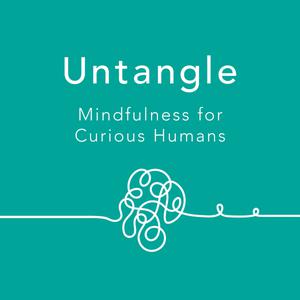 Untangle
Untangle
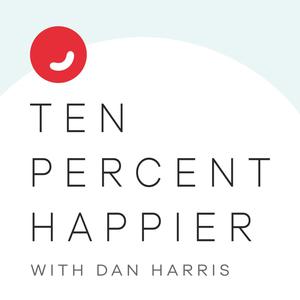 Ten Percent Happier with Dan Harris
Ten Percent Happier with Dan Harris
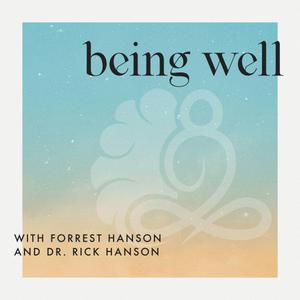 Being Well with Forrest Hanson and Dr. Rick Hanson
Being Well with Forrest Hanson and Dr. Rick Hanson
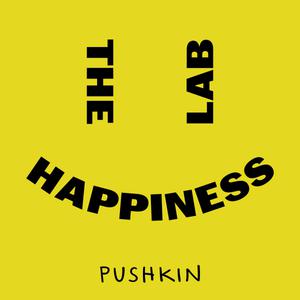 The Happiness Lab with Dr. Laurie Santos
The Happiness Lab with Dr. Laurie Santos
 Good Life Project
Good Life Project